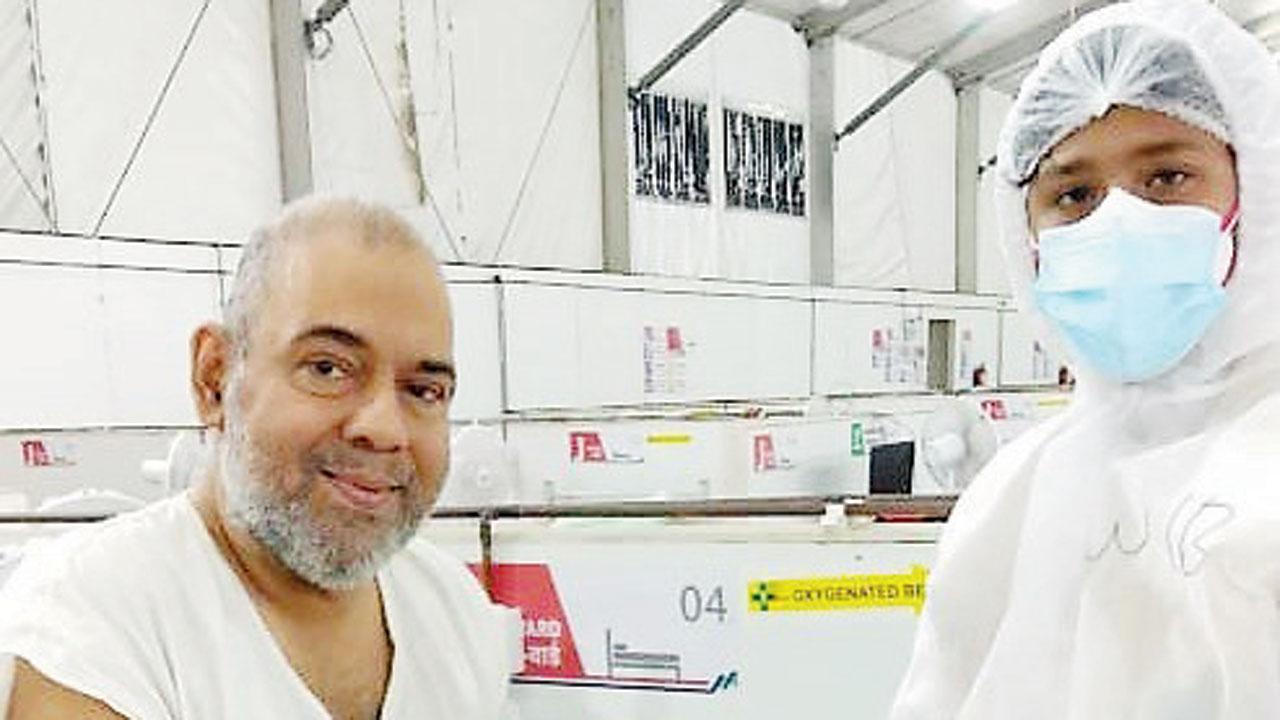Acknowledging minor spike in fresh incidence of COVID-19 since trains were restarted, doctors at BKC jumbo centre say most patients are in the 35-55 age group

Patient Nishant Rangnekar at the BKC Jumbo Centre
The slight surge in the number of fresh COVID cases in Mumbai and other parts of Maharashtra has prompted experts to caution that a second wave might be on its way. But unlike the first phase of the virus attack, the severity is less this time, they say. The BKC COVID Jumbo Centre has reported a marginal rise in the number of patients getting admitted.
Dr Subhash Hira, Professor of Global Health at the University of Washington-Seattle and advisor to UN and Indian health agencies; Dr Ketan Vagolkar, professor of Surgery, D Y Patil Medical College; Dr Wiqar Shaikh, Professor of Medicine, Grant Medical College and Sir JJ Group of hospitals
As of Tuesday, it had 192 patients, including 40 in ICU. By late evening, six more were brought in from Mulund Jumbo Centre for close monitoring.
Dr Rajesh Dhere, dean of the BKC centre, said people aged between 35 and 55 form the bulk of the new cases. "We presume they might have come in contact with infected carriers during the initial days, soon after the local trains were reopened for everyone. We will have to wait and watch for the next 14 to 28 days to check the pattern."
The upward trend in Mumbai and across MMR was expected, said Dr Ketan Vagolkar, professor of Surgery, D Y Patil Medical College, underlining that it should serve as a warning to citizens. "Special emphasis should be laid on the use of a mask, especially on public transport vehicles and stations. Despite taking precautionary measures, if one has the slightest doubts about COVID symptoms then the family physician or nearest healthcare facility should be contacted immediately,” said Dr Vagolkar.
A pandemic sets off waves for an unpredictable length of time, said Dr Wiqar Shaikh, professor of Medicine, Grant Medical College and Sir JJ Group of hospitals, as he sought to not paint the current situation alarming. "The spikes will not be as bad compared to the first spike. All subsequent spikes should be expected to be lower than the previous one."
Humans have lived with bacteria and viruses for centuries and the coronavirus too is here to stay, he said. "On the contrary, everything needs to be opened up, including schools, colleges, trains and flights," said Dr Shaikh.
Testing being done at the virus immunology centre inside the BKC Jumbo COVID Centre. File pic
The expert said daily cases have plunged from 1 lakh in September last year to about 10,000 on Monday. "This is an indication of ‘herd immunity’ developing in the Indian population particularly in view of the fact that only a small fraction of the Indian population has been given the first dose of the COVID-19 vaccines so far," said Dr Shaikh, adding that herd immunity is of utmost since it will take years to inoculate the entire population.
Dr Subhash Hira, Professor of Global Health at the University of Washington-Seattle and advisor to UN and Indian health agencies, said at a recent WHO review among over 100 scientists, concerns were raised over the emergence of mutant strains in Europe, South Africa, Brazil and North America.
"Almost 93 per cent of these new cases in South Africa are attributed to a new strain called B.1.351," said. In the case of the South African strain, the AstraZeneca vaccine has been found to be only 10.4 per cent effective, he said, adding this has triggered rumours that the African nation has decided to return 1 million doses of CoviShield. "Incidentally, travel restrictions in South Africa were already strict in the past two months, and travel is less likely to have contributed significantly to rapid spread of mutant strains,” said the expert.
Similar more potent mutants, labelled as B.1.1.7 and P-I have emerged from Brazil, once again swarming hospitals with patients, he said.
"Brazilian scientists are considering three possible reasons that will also be applicable to resurgence of COVID cases in Mumbai and other cities of Maharashtra, and elsewhere in India. First, possibly the protective antibodies of the first wave that happened during April-August 2020 started to wean away within six months. Second, new mutant strains seem to be evading immunity protection generated by the first wave during the first six months itself. Third, the mutant strains might have better transmissibility rate, causing a fresh wave of cases. Most scientists believe that it is a combination of all three reasons in these countries that are facing a fresh new wave of cases," Dr Hira said.
Any laxity over masks and other protocols will cost everyone dearly, said Dr Hira, stressing the need for tracking. "Surveillance of mutant strains such as the British one has been slow by the ICMR. Some remote tests for South African and Brazilian mutants by ICMR might have been initiated but not yet reported globally."
He added, "A sobering lesson for the Indian ministries of health, research agencies, and vaccine companies is to secure our national environments once again before similar shutdowns of the past become mandatory options."
 Subscribe today by clicking the link and stay updated with the latest news!" Click here!
Subscribe today by clicking the link and stay updated with the latest news!" Click here!







